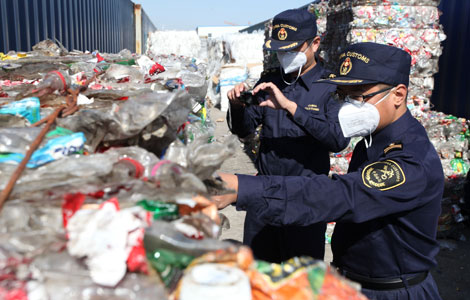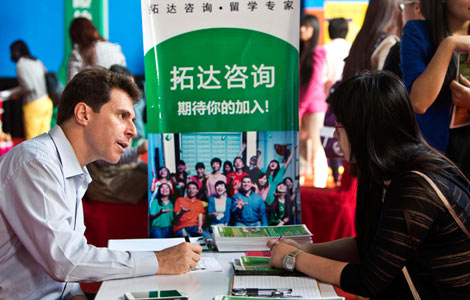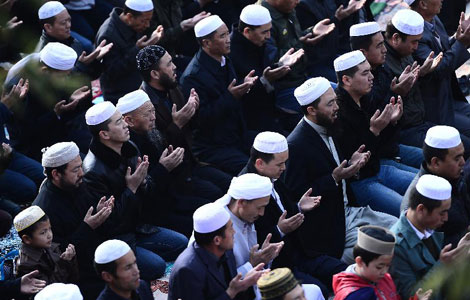Cooperation on the Pacific horizon
Updated: 2013-10-18 08:12
By Kurt R. Spillmann (China Daily)
|
||||||||
The "rebalancing" of US attention, activities and forces toward the Pacific as it has been officially announced and pursued by the White House, US foreign policy and the Pentagon since the beginning of 2012 has aroused concerns in Beijing with regard to the actual intentions behind this change in strategy.
China fears that the entire "strategic turnabout" of the United States from the Atlantic to the Pacific could primarily be to impede China's further ascendancy in order to keep China as weak as possible for the in the eyes of a few very conservative US strategists inevitably imminent confrontation in the Pacific.
Conversely, many Western especially US politicians fear that with its tremendous potential China could not only become an economic danger but also militarily oust the US from its leadership and regulatory role in the long term.
A conference which the Chinese Charhar Institute and the Swiss Media Tank Foundation earlier this year in Zhangjiakou, not far from Beijing, was devoted to handling uncertainties pertaining to mutual perceptions of intentions.
As became clear at this meeting, on the Chinese side there is a great need for explanation with regard to the historical role of the Middle Kingdom as well as the current military and security policy aspirations.
The initiation of trust-building measures on a strategic level, specifically and first and foremost in the relationship with the US, is up for discussion.
The meeting between presidents Barack Obama and Xi Jinping in California in June in which minor corresponding resolutions were also immediately adopted also pursued this objective.
The summit meeting attracted astonishingly little attention in the US media, at any rate less than the disclosures of Internet intelligence expert Edward Snowden about US cyberhackers or the demands by Senator John McCain for the White House to finally arm the Syrian rebels. This was due to the fact that both heads of state viewed the meeting as "strategic", i.e. without obligation, to concretely solve urgent problems. In fact, they wanted to lay a foundation for a collaboration reaching far into the future.
This resulted in agreements concerning common efforts in two areas: to reduce the production and emission of chlorofluorocarbon (a central topic of climate protection) and to urge the Democratic People's Republic of Korea to resume negotiations on nuclear disarmament, also a central topic of international security policy. This was criticized by various US commentators, yet these critics did not understand that it actually involved much greater questions which could not be discussed publicly.
It involves the avoidance of an unnecessary and unfruitful rivalry of the two greatest powers in the Pacific region and if possible the establishment of a cooperative order in the Pacific.
China had been a major power in the Pacific long before the US existed, and the memories of a presence as a world power uncontested for two and a half thousand years have strongly returned to consciousness with China's economic ascendancy since the Deng Xiaoping era.
The period of humiliation since the Opium Wars through the Western colonial powers with their superior military equipment is only seen as a brief interruption in China's major power status, with corresponding residual mistrust toward Western intentions and the expectation that China's historically established territorial claims will be respected.
China has long since reclaimed the South China Sea as national territory "since time immemorial" and substantiates this claim through maps, old documents and archaeological finds. China wants to be recognized as an equal major power by other countries.
With Obama there is a man currently residing in the White House who would like to implement a new model of collective promotion of economic development in the entire Pacific region through dialogue under the leadership of the world's two largest economies.
It remains to be seen to what extent individual issues pertaining to economics, security and alliance policies can burden the budding partnership.
History's first strategist, Sun Tzu, who wrote the Art of War over 2,000 years ago, substantiated the proclivity of Chinese heads of state for indirect warfare by using all those means which are referred to as "soft power" today. Because according to his basic assumption, the best war is the war not fought if one can achieve its objectives by other means.
In the modern world, this phrase has obtained new validity through the destructive power of existing weaponry. Philosopher Karl Jaspers formulated the expression "there must be no more war" after the first use of an atomic bomb in Hiroshima, because any war could lead to the self-destruction of humankind.
One can only wish luck and success for the efforts of the two greatest powers on this earth to want to collectively tackle the challenges of the future.
The author is professor emeritus, Swiss Federal Institute of Technology Zurich.
(China Daily 10/18/2013 page8)
Most Viewed
Editor's Picks

|

|

|

|

|

|
Today's Top News
US not budging on its arms restrictions on China
Can cranberries catch on in China?
Asia-Pacific pays executives world's highest salaries
US debt deal a temporary fix
China is No 1 oil importer
Millennials worried about finances
Elderly group sorry about roles in turmoil
Investigation to diagnose nation's TCM resources
US Weekly

|

|














